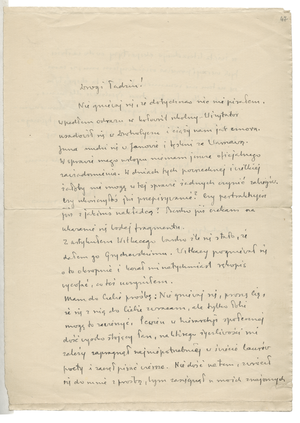Drogobych. Bruno Schulz writes a letter to Tadeusz Breza.
Schulz’s letter to Tadeusz Breza, a writer, essayist and editor of Kurier Poranny*, begins with an apology for his prolonged silence. Then Schulz raises several current topics. Firstly, he presumes that the national mourning after the death of Marshal Józef Piłsudski* will paralyze the activity of the Ministry of Religious Creeds and Public Enlightenment* and will indirectly delay the matter of leave for which he is applying. Secondly, he asks Breza about the manuscript of his debut novel: “Have you negotiated with a publisher yet? I am very much waiting for at least a fragment to be published”. Thirdly, Schulz recollects a misunderstanding which he himself inadvertently caused by handing Witkacy’s* article to Mieczysław Grydzewski* (Wiadomości Literackie)*, with whom Witkacy remained in conflict.
The final part of the letter is peculiar: Schulz asks Breza to offer a favorable review of poems written by a friend of Schulz’s – not mentioned by name in the letter (“A man holding high social status whose kindness I care about”): “If this expert opinion appears bad – the said gentleman will lose his kindness towards me. So, if you can reconcile it with your conscience – be gracious and write something non-bindingly positive. I’m sending you the poems, which I don’t myself understand. I don’t see any sense in them”. (jo)
See also: 20 March 1935*, 12 May 1935*, 2 June 1935*, 24 August 1935*, 5 July 1936*, 26 July 1936*.


